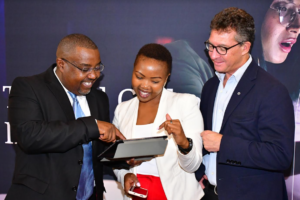Huawei pitches Kenyan universities to enhance investments in research, partnerships to drive innovation

Huawei Technologies has urged Kenyan institutions of higher learning to raise the level of investment that they put into research and to build stronger, deeper private sector partnerships to grow the countries’ digital innovation pipeline.
Speaking during this year’s Africa Division’s International Association of Science Parks and Areas of Innovation (IASP) Conference at Konza Technopolis, Huawei Kenya Vice Director for Programs Management, Maureen Mwaniki underscored the importance of Research and Development for the success of the Kenyan economy noting it urgently requires Kenyan universities and technical institutes to remarkably increase their degree of investment to deliver more innovative products and services.
High levels of investment in research and technology, she said, have been linked to innovation, competitiveness and economic and social progress.
Themed ‘Science and Technology Parks and Areas of Innovation as Catalysts of Sustainable Growth in Africa’, the conference was designed as a platform to share knowledge and experiences on matters innovation and technology development.
It was officially opened by Joe Mucheru, the Cabinet Secretary for ICT, Innovation and Youth Affairs who lauded private sector firms such as Huawei for supporting other players in academia to build the youths’ ICT skills. He also noted that the government was committed to partnering with ICT players including Huawei to build a skills database designed to match skills to available industry opportunities.
Echoing his remarks, Ms. Mwaniki said that progressive innovation requires multiple things including commitment, self-reflection and learning, and a supportive environment. “This requires attention from management and workers, learning what the market has, the market/customer needs, mistakes the innovator has made, and constantly evolving to improve the product or service, be it functionality, quality, price point or business model. Ultimately innovation needs mentors, training, guidance and an ecosystem of partners including suppliers, developers, retailers, service and maintenance partners or investors, to bring the idea to market,” she said.
The innovation journey, explained Ms. Mwaniki, always begins from having a strong self-drive in wanting to participate in building the technology space. Fortunately for Kenyans, there are several areas that one can build upon and problems to solve with technology. “It is highly encouraging that young men and women are emerging to present great technology-driven ideas and solutions,” she added.
In addition, Ms. Mwaniki noted that partnerships were a critical factor and committed the firm’s support towards initiatives such as the IASP conference in which deliberations are designed to grow the country’s innovation pipeline. This includes bringing together different partners for these initiatives to support the youth with facilities that include training and access to investors “We believe this event is useful and important for fostering partnerships and developing ideas which can drive innovation in Kenya,” said.
According to the Ministry of Education website, Kenya has over the years been allocating Kshs 400 million annually to finance research and innovations, with a yearly pipeline of just about 1,000 projects. The funding target though is much larger, pegged at 2 per cent of the country’s Kshs 1 trillion GDP, translating to about Ksh 200 billion.
Kenya’s ranking on innovation investment (input) sub-index was 89 out of 129 countries in 2020, with a score of 38 points out of 100, according to the global innovation index. This placed the country in the bottom third of the list in terms of investment. The score has been stagnant since 2011 despite the potential of innovation in reducing the unemployment rate, which stands at 19 percent among young people aged 15-24, according to the World Bank.
Spending on research, science, technology and innovation under the State Department for University Education was estimated to be Sh2.49 billion in the 2018/2019 financial year, according to the Treasury, accounting for two percent of the total spending on university education. Overall, the country spends 0.8 percent of its GDP on research, thus punching far below its weight in innovations.






